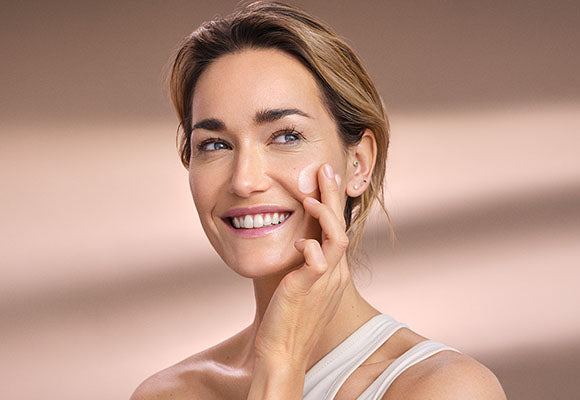Stick with us for the A-Z of Protinol™
Ah, skincare. Our bathroom shelves are stacked with everything from serums to acids to moisturisers, all promising complexion perfection. But what if there was an easier way to achieve younger-looking, smoother-feeling skin? Step forward Protinol™.
We’re talking skin sense with the lowdown on our exclusive ingredient (that’s right, you won’t find Protinol™ anywhere but Avon), how it differs from retinol and why it’s fast becoming a must-have. Ready?


What is retinol?
If you’re a skincare junkie (no judgement here, we promise!), you’ve probably come across a little something called retinol. A derivative of vitamin A and hailed as a skincare saviour thanks to its impressive list of anti-ageing properties, it takes pride of place on the shelves of beauty bloggers, celebrities, and us alike.
How does retinol work?
We’re glad you asked! Retinol helps reduce the appearance of the pesky signs of ageing – think sun damage, wrinkles, and dark spots – by increasing cell turnover in the skin.
How to apply retinol
We all know the saying “a little goes a long way,” right? It’s super important to remember this when adding retinol into your skincare routine. It’s powerful stuff, so it’s best to start using formulas with lower percentages of retinol and increasing the strength over time. Another thing to remember in the retinol rulebook is using products containing it only in your evening skincare routine. That’s because retinol can cause your skin to be sun-sensitive – so don’t forget your SPF during the day.
Set to rival retinol and change the complexion game is Protinol™ – cue the cheering.
What is Protinol™?
Developed by our beauty buffs, the ingredient Protinol™ is clinically proven to restore two types of collagens (collagen I and collagen III, sometimes known as baby collagen) found in healthy-looking skin. Collagen helps to support the skin’s strength – giving it that extra oomph. Our bodies produce less and less of it as we get older (don’t worry, it’s a natural process), leaving skin thinner and more prone to damage.
How does Protinol™ work?
The appeal of Protinol™ is its ability to bring those two types of collagens together, meaning you can expect to see results like firmer-feeling skin in just seven days* – wow.
How to apply Protinol™
With our ANEW Renewal Protinol™ Power Serum of course! Promising seven (yes, SEVEN) skin-sational benefits – smoother-feeling skin and a radiant-looking glow, to name just a couple – the hard-working and budget-friendly formula packs a punch with the power of Protinol™ and niacinamide. Apply to your face and neck morning and night after cleansing, following with your night cream – we’ve got you covered there too with the ANEW Platinum Night Replenishing Cream. Trust us when we say this is your new serum soulmate.
Retinol vs Protinol™
In the fight between retinol and Protinol™, it’s evenly matched when it comes to anti-ageing benefits. But it’s the way the skin reacts that puts Protinol ™ ahead of the competition. It’s a gentle alternative to retinol and helps calm the skin – no dryness in sight – while tackling the signs of ageing. A win-win for those of us with sensitive skin.
Not only that, but Protinol™ can work quicker** than traditional retinol, so you can expect to see stronger-feeling, more radiant-looking skin in a flash.
So, let’s recap the benefits of Protinol™. It’s gentler, quicker, and more effective than retinol – no wonder everyone wants in on the action.
*Based on 206 participants who expressed their opinion in a consumer perception study. **Based on a historical comparison of clinical testing results across internal Avon formulations containing retinol as compared to formulations containing Protinol™.



